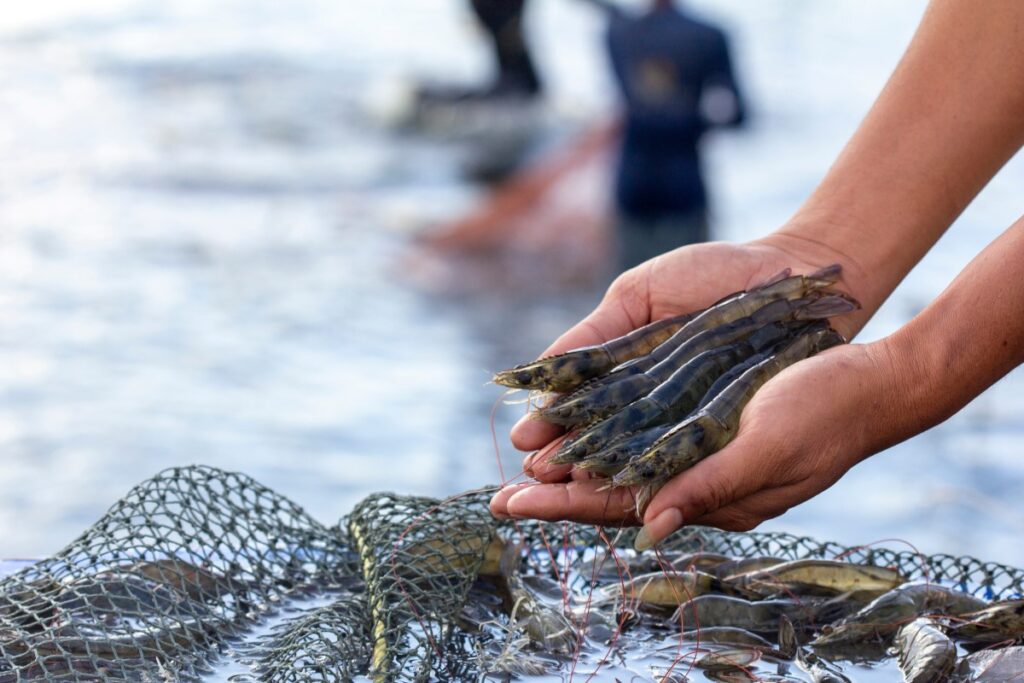Cutting the carbon

Seafood giant Thai Union aims to get more sustainable shrimp onto the world’s supermarket shelves
Thai Union Group, the world’s seafood leader, has launched an innovative programme to significantly reduce greenhouse gas (GHG) emissions within the shrimp supply chain. The Shrimp Decarbonisation initiative has been developed in collaboration with global environmental organisation The Nature Conservancy (TNC) and retail group Ahold Delhaize USA.
Thai Union Group PCL is one of the world’s seafood leaders, with annual sales exceeding THB 136.2bn (£2.86bn) and a global workforce of more than 44,000.
The company’s global brand portfolio includes market-leading international brands such as Chicken of the Sea, John West, Petit Navire, Parmentier, Mareblu, King Oscar, Hawesta and Rügen Fisch.
The shrimp pilot programme has a target of producing 1,000 metric tons of processed shrimp that is both lower impact and meets the highest product quality standards. The shrimp will be imported by Thai Union subsidiary, Chicken of the Sea Frozen Foods, and it will be fully traceable from hatchery to the final point of shipment.
This initiative demonstrates, the company says, Thai Union’s commitment to environmental stewardship and its ambition to lead the seafood industry towards a more sustainable future by driving towards its SBTi (Science Based Targets initiative) approved 42% reduction in GHG emissions within its own operations and supply chain.
Launching the programme, Adam Brennan, Chief Sustainability Officer at Thai Union, said: “Working alongside The Nature Conservancy allows us to pioneer a model of shrimp production that is not only more environmentally responsible but also economically viable. Our pilot programme for 2024 is a testament to our dedication to reducing carbon emissions and setting new sustainability benchmarks in the seafood industry.
“The Shrimp Decarbonisation programme is not just about reducing emissions; it’s about transforming the shrimp industry into a more sustainable, efficient and equitable sector. By proving that sustainable practices can lead to economic benefits, we aim to inspire and lead the way for the entire industry.”
The programme’s primary focus is making on-farm investments to enhance efficiency and productivity, reduce energy usage and increase sourcing of sustainable feed ingredients. Together, feed and farm optimisation are identified as the key drivers for achieving productivity gains and emissions reductions.
Following the pilot’s success, Thai Union plans to scale these efforts across other shrimp farms in Thailand and beyond.
Ahold Delhaize USA, parent company of one of the largest grocery retail groups in the United States, is supporting the programme with two of its brands, Food Lion and Hannaford.
“Ahold Delhaize USA and each of our local brands is deeply committed to sustainability and responsible sourcing across the supply chain, and we take seriously our role in partnering with suppliers and other stakeholders to create innovative solutions to address climate change,” says Marc Stolzman, Chief Sustainability Officer for Ahold Delhaize USA. “The Shrimp Decarbonisation initiative represents a big step forward in sustainable aquaculture. We are proud to partner on this project, which we believe has significant potential for the retail sector and further advances our work to enable healthier people and a healthier planet.”
The intervention packages, which are tailored for different farm types and can include installation of photovoltaic panels at the farms, will be implemented in two phases.
These sustainability interventions are projected to reduce GHG emissions, Thai Union says, showcasing the programme’s potential to make a substantial environmental impact.

Adam Brennan, Chief Sustainability Officer of Thai Union
ASC improvement project
Last September the Aquaculture Stewardship Council launched a framework for Aquaculture Improvement Projects (AIP) in the shrimp sector, at the Global Shrimp Forum in Utrecht, in the Netherlands.
The Shrimp AIP applies similar principles to existing finfish programmes, enabling producers that are not ready yet to meet the full ASC standards to show that they are still improving their performance.
Thai Union was announced as a partner for the new programme. The company Thai Union will be one of the first setting up an AIP and aims to bring more than 4,000 metric tonnes up to ASC certification and another 11,700 metric tonnes in volume implementing best practices in line with the social and water quality requirements of the ASC Standards.
The ASC principles have been incorporated into Thai Union’s SeaChange® 2030 sustainability strategy which includes ambitious goals for “people and planet”.
Through SeaChange®, the company has been recognised and listed on the Dow Jones Sustainability Indices (DJSI) for the 10th consecutive year in 2023 and ranked number one on the Seafood Stewardship Index (SSI) for the third consecutive time.


